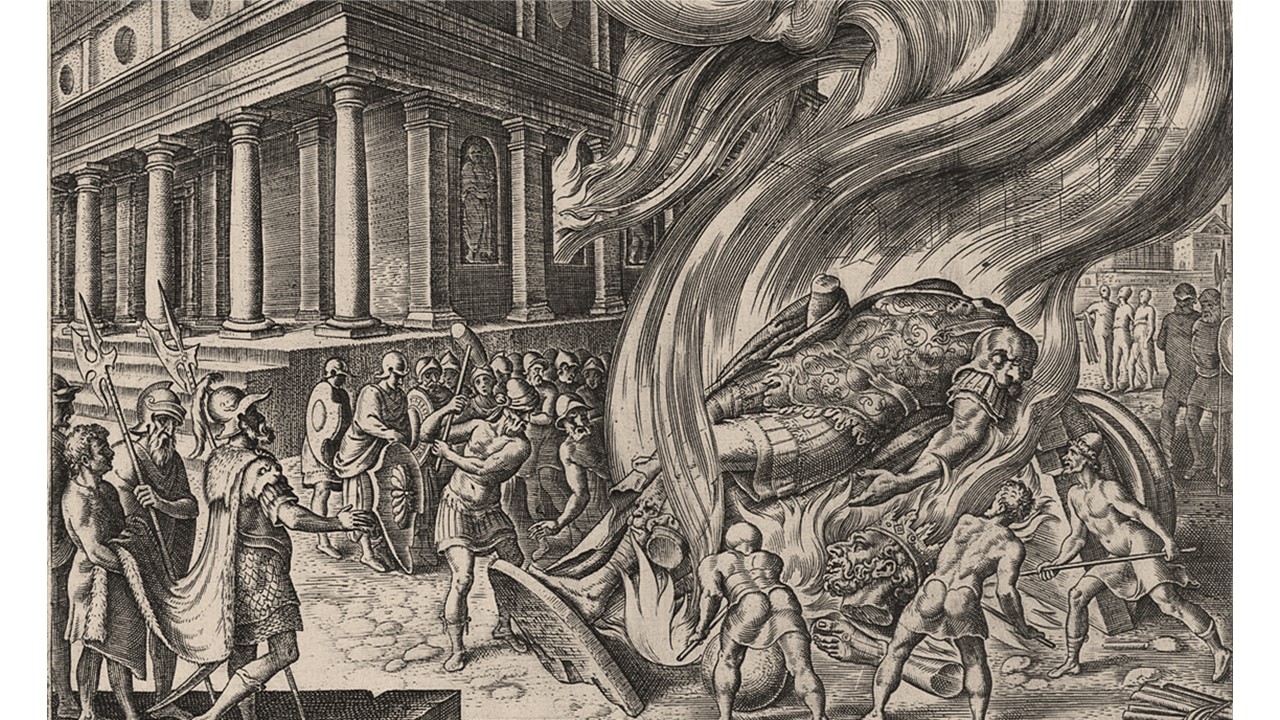.
Jehu Destroys the Temple and Statue of Baäl
“—What did that madman want?” —2 Kings 9:11
He saw Jehu Destroys the Temple and Statue of Baäl,
the print by Maarten van Heemskerck of darkness to appall.
He saw the flames inside the Temple—from windows pouring forth—
the headless form fanned by high billows, burned in blazing force,
the pedestal worn down like Ozymandias before,
the bearded men, in violence, the head and leg parts shorn.
He saw Jehu stand on the steps before the fire and stones,
off to his right within the light of might and bright backbones,
the crowds around, both near and far, observing this great feat,
and the grand crown come tumbling down onto the cobbled street.
.
.
Bruce Dale Wise is a poet and former English teacher currently residing in Texas.
















This is brilliant in its description, its rhythm, and its use of alliteration and internal rhyme. I absolutely LOVE the line referring to Ozymandius! Great poem.
Excellent writing of the poem wonderfully matched with the work of art.
Despite some overuse of alliteration and the anapests after Temple, there is some competent writing, in regards to th’ engraving.
A violent destruction scene with wondrous contrasts of dark and bright. You’ve put the fire into words well, Bruce.
I must admit it nearly always seems strange to me whom I draw on poetic’lly in any particular line. Of course, it is the image expressed by the youthful English Romantic poet Percy Shelley (1792-1822) that was the touchstone of L5, that Ms. Erlandson has drawn attention to. It might seem odd to use Shelley in a poem that draws from the Dutch engraver and painter Maarten van Heemskerk; but Shelley’s sonnet was one of many works that drew me to the tennos, particularly for its extraordinary rhyme scheme, if not the rhythm Ms. Erlandson has also mentioned, which likewise came out of what John Hollander (1929-2013) called the “Romantic verse form and the metrical contract.” At points, the “internal rhyme” is oppressively on the ictus, as in L8, or a little too heavy, as in L10. But there is more in the poem, and perhaps Ms. Erlandson is referring to some of those examples, especially those beyond single lines.
Cribbing from not just Shelley, but Frost, too, and folded into a poem on a van Heemskerck etching, no less! Very canny, since, as everyone knows, you can never go wrong writing about the Dutch Masters, nor, for that matter, stealing from Frost and Shelley.
The diction of this tennos strives for some of that simplicity and coarseness found in both the darkness of Robert Frost (1879-1962), as Mr. Wasem has pointed out, and th’ engraving by Maarten van Heemskerk (1498-1577).
Of course, Maarten van Heemskerk’s reference is to the text of 2nd Kings (c. 460 BC – c. 440 BC), where the decline and collapse of the kingdoms of Israel and Judah are described, the key allusion, and reference to the recent election of Donald J. Trump, so different from my poems of 2016.
The tennos only mentions Ozymandias, but does not linguistic’lly draw from Shelley’s poem; whereas the following fifteen lines of iambic pentameter from two decades ago do.
Ozimand
by “Scribe” El Uwade
He was the ruler of an antique land,
the Pharaoh Rameses the Second. Grand,
stone temples crossed his kingdom of the sand,
like that at Abu Simbel, now o’erspanned
by th’ Aswan High Dam’s watery command,
or Hypostyle Hall at Karnak. These stand
as monuments, with others, to the hand
that led a nation to the world he scanned.
Such was the empire that his subjects spanned:
it went from Upper Egypt to the strand
along the Delta of the Nile and fanned
up to Kadesh, where with twice ten thousand
he faced the Hittites, twice as many manned.
And afterwards, that bloody act’s demand,
the first peace treaty in the world was planned.
“Scribe” El Uwade is a poet of Egypt and the Nile. This 15-lined qasida is a counter to the sonnet “Ozymandias” by Romantic British poet Percy Shelley (1792-1822). Pharaoh Rameses II (c. 1303 – c. 1213) was a noted figure of the New Kingdom.